
SIBO often causes significant discomfort, sluggish digestion, and weak gut motility. Fortunately, several SIBO natural treatment options are available. These options focus on reducing symptoms such as abdominal pain and bloating. Small intestine issues, such as nutrient deficiencies and chronic stress, play a crucial role in the development of SIBO. Implementing natural remedies can help improve gut health and manage symptoms effectively.
Nudge, a digestive health supplement, offers an all-in-one solution for treating SIBO. It primarily addresses gut motility, core nutrition, and stress, the three root causes of small intestinal bacterial overgrowth. Focused on SIBO, a common type of IBS, our natural supplement does not require a prescription. This approach helps reduce the overgrowth of harmful bacteria while promoting the growth of good bacteria in the gut microbiota.
Backed by detailed scientific research, we’ve compiled this guide to explore various SIBO natural treatment options. We will also explore how to treat SIBO to improve your gastrointestinal tract's health. By the end, you’ll gain insights into managing SIBO symptoms naturally, including specific remedies for conditions like celiac disease, Crohn’s disease, and irritable bowel syndrome.
Let's jump in!
What is Small Intestinal Bacterial Overgrowth (SIBO)?
Small Intestinal Bacterial Overgrowth (SIBO) occurs when excessive bacteria populate the small intestine. This condition disrupts the gut microbiome, leading to various digestive symptoms. Risk factors include prior use of antibiotics, gastrointestinal conditions like inflammatory bowel disease, and low stomach acid. Diagnosis often involves a breath test to detect hydrogen and methane gas levels.
Common Symptoms of SIBO
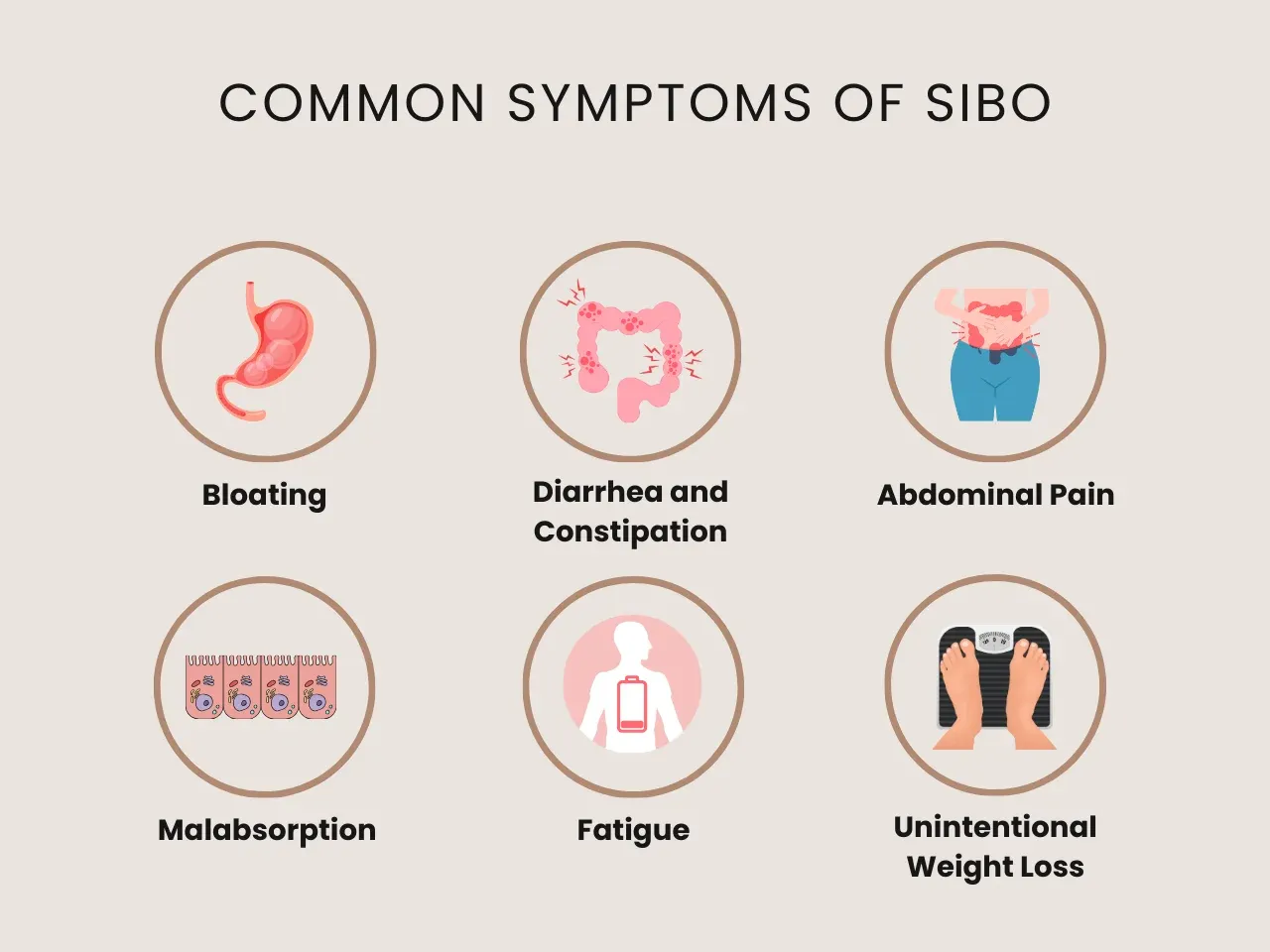
- Bloating: Excess bacteria in the small intestine produce gasses that cause bloating.
- Diarrhea and Constipation: SIBO disrupts normal bowel movements, leading to diarrhea or constipation.
- Abdominal Pain: Inflammation and gas in the digestive tract can cause discomfort and pain.
- Malabsorption: Bacterial overgrowth impairs nutrient absorption, leading to deficiencies.
- Fatigue: Poor nutrient absorption and chronic digestive issues can result in fatigue.
- Unintentional Weight Loss: Inefficient nutrient absorption results in weight loss.
Dealing with SIBO requires understanding what causes it and how it affects the body. Knowing how to check for sibo, such as through breath tests, can help in keeping track of hydrogen and methane gas levels in your gut. This helps make sure SIBO is diagnosed correctly.
Additionally, understanding the risk factors for SIBO and being aware of the health of the gut microbiome is crucial. Be sure to learn about SIBO and how it impacts the digestive system so you can take steps toward better overall health and well-being.
8 Effective SIBO Natural Treatment to Alleviate Symptoms
SIBO can cause significant discomfort and digestive disturbances. Addressing these symptoms effectively requires a targeted approach that leverages natural treatments to restore gut health and alleviate distress. Let’s explore the 8 SIBO natural treatments to rebalance the gut microbiome and reduce bacterial overgrowth, promoting digestive wellness and overall well-being.
1. Dietary Adjustment
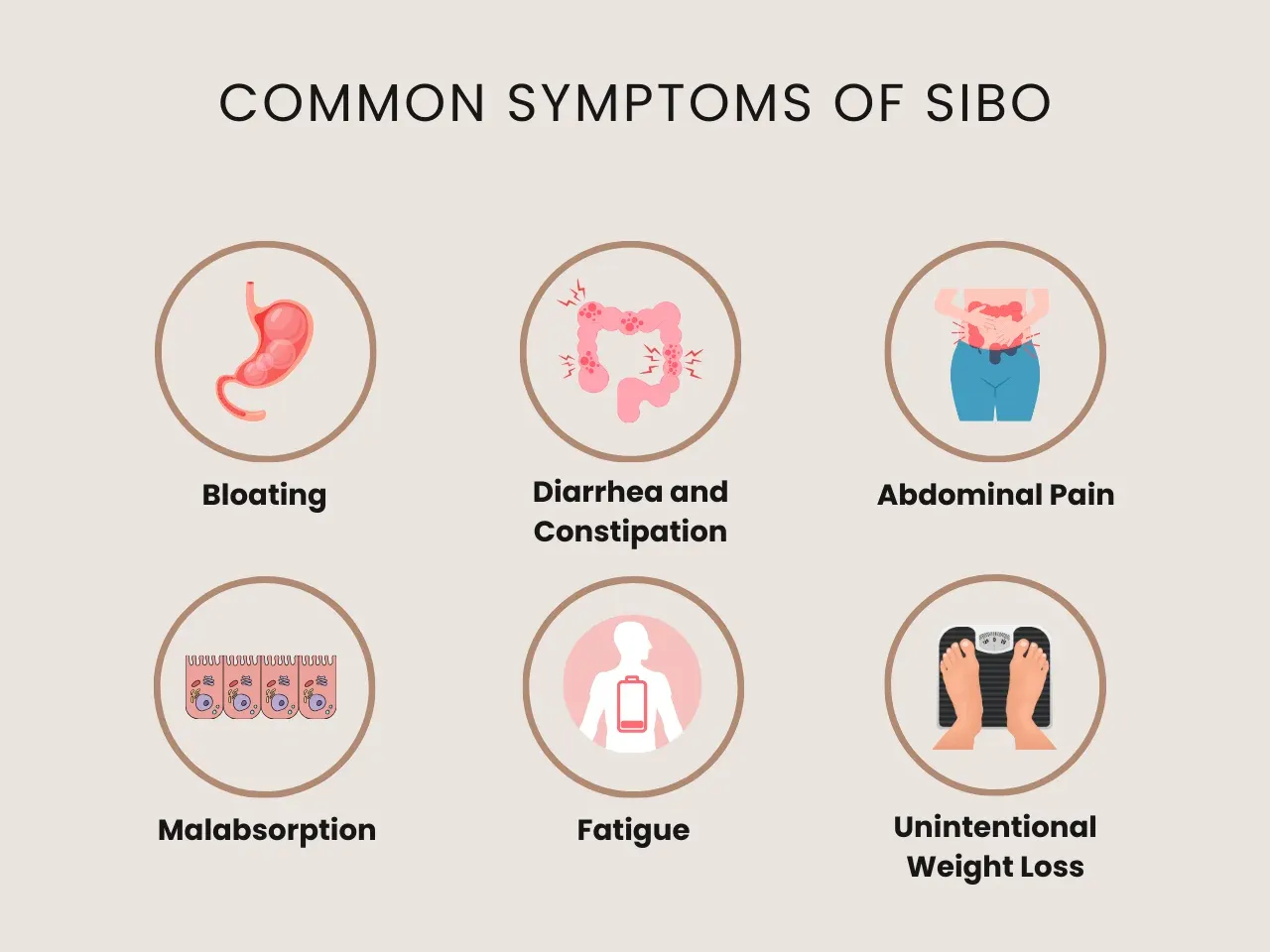
Dietary adjustments play a crucial role in SIBO natural treatment. A low-FODMAP diet, designed to reduce fermentable carbohydrates, can alleviate symptoms. This diet limits foods that ferment in the intestines, reducing bacterial overgrowth and associated discomfort.
Here are some high-FODMAP foods to avoid:
- Garlic
- Onions
- Beans
- Apples
- Wheat products
- Dairy products
- Cauliflower
- Rye
Adopting a low-FODMAP diet can significantly improve SIBO symptoms. Low-FODMAP foods to include:
- Unripe Bananas
- Carrots
- Spinach
- Quinoa
- Chicken
- Lactose-free yogurt
- Potatoes
- Zucchini
Meal planning for a low-FODMAP diet means choosing foods that are easy to digest. For breakfast, consider an unripe banana smoothie. Blend it with lactose-free yogurt and spinach. At lunchtime, try a quinoa salad. Top it with grilled chicken, fresh spinach, and a light olive oil dressing. Baked salmon with roasted carrots and steamed zucchini is a tasty option for dinner.
These meal choices help manage digestive symptoms, and they provide balanced nutrition with varied foods. Following a low-FODMAP diet makes it a good option for SIBO natural treatment and brings relief from bloating, gas, and digestive discomfort. It even aids in better nutrient absorption from food, improving the overall quality of life.
2. Incorporate Natural Prebiotics and Probiotics
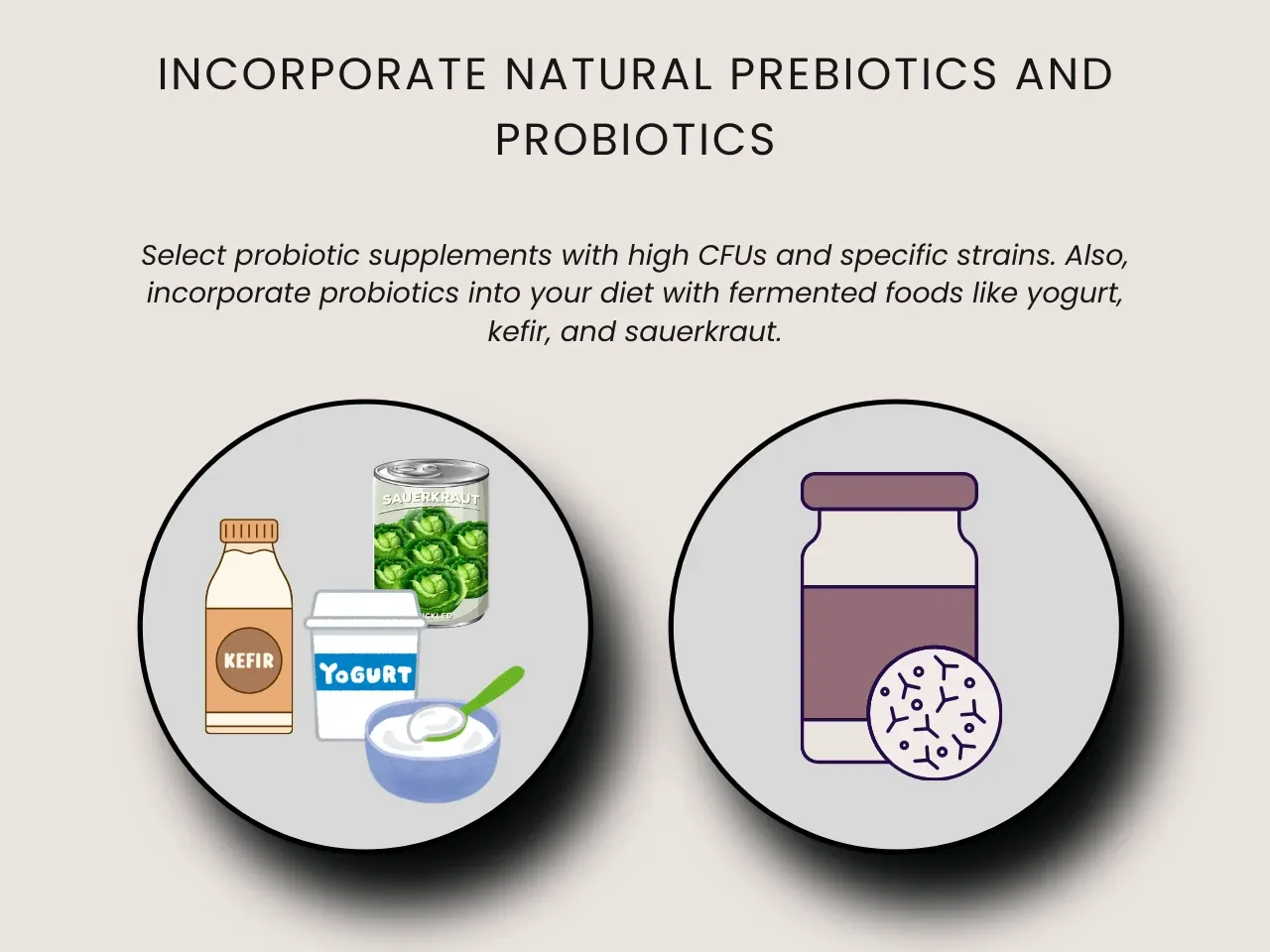
Taking probiotics is another best SIBO natural treatment and an essential step toward maintaining a healthy gut. These beneficial bacteria help to balance the diverse community of microorganisms residing in the digestive tract, known as the gut microbiome. When the gut microbiome is out of balance, it can lead to various digestive issues, including SIBO.
Specific strains beneficial for SIBO include:
- Lactobacillus plantarum: Reduces inflammation and improves intestinal barrier function.
- Bifidobacterium lactis: Supports digestion and alleviates bloating.
- Saccharomyces boulardii: Helps prevent diarrhea and promotes gut immunity.
Selecting the appropriate probiotic supplement necessitates thoughtful evaluation. Prioritize supplements boasting significant quantities of colony-forming units (CFUs) and the aforementioned specific strains. Furthermore, integrate probiotics into your dietary regimen by consuming fermented fare, including yogurt, kefir, and sauerkraut.
Watching and changing how many probiotics you take is key for treating SIBO naturally. Start with a small dose to see how your body reacts. Slowly take more as needed, noting any changes in symptoms. See a doctor regularly to adjust and optimize your probiotic routine properly.
3. Implement Intermittent Fasting
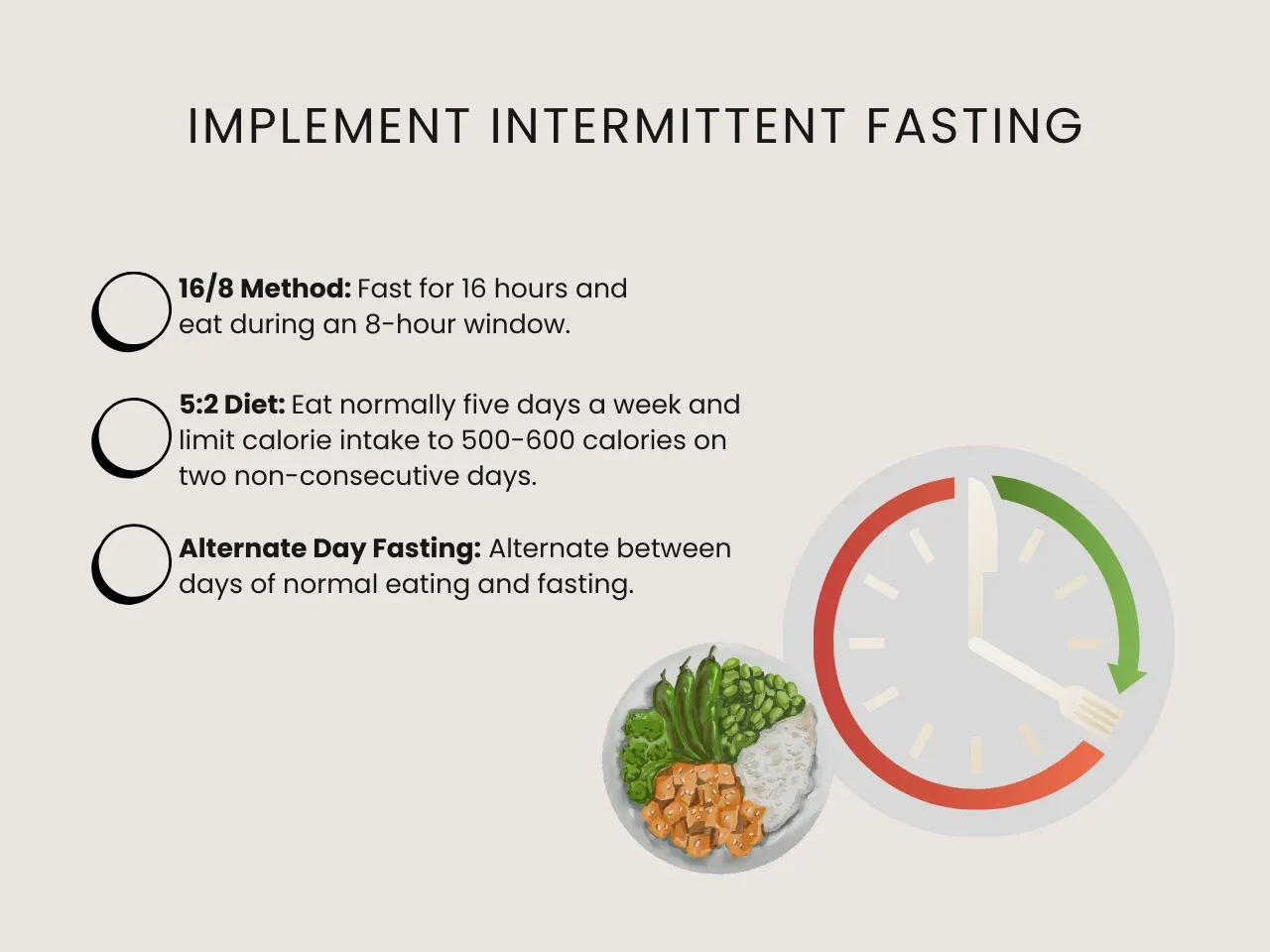
Fasting for set periods can be a useful way to manage SIBO. Intermittent fasting involves alternating times when you eat and times when you don't. This gives your digestive system a rest. During the fasting periods, your small intestine has less food to help bacteria grow. Intermittent fasting makes the small intestine less hospitable for harmful bacteria. This SIBO natural treatment allows your digestive system to regain balance and control bacterial overgrowth.
Different intermittent fasting methods:
- 16/8 Method: Fast for 16 hours and eat during an 8-hour window. This method is the most popular and can be easily integrated into daily routines. For example, you might eat from noon to 8 PM and fast from 8 PM to noon the next day.
- 5:2 Diet: Eat normally five days a week and limit calorie intake to 500-600 calories on two non-consecutive days. This method provides flexibility and helps manage calorie intake while allowing significant eating days.
- Alternate Day Fasting: Alternate between days of normal eating and fasting. This method can be more challenging but effective for some individuals. On fasting days, you may consume minimal or no calories.
Giving your digestive system a break through intermittent fasting can provide relief for those dealing with SIBO. This strategy allows the gut to eliminate excess bacteria and reduce inflammation. Incorporating regular fasting periods, individuals may experience a reduction in uncomfortable symptoms like bloating, gas, and abdominal discomfort. Additionally, this SIBO natural treatment aids in regulating bowel movements and enhancing overall gut health.
Start intermittent fasting with a simple method like the 16/8 approach. Gradually extend fasting periods and monitor how your body responds. Stay hydrated and consult a healthcare professional to ensure it suits your health needs. Ensure you eat nutrient-dense foods during eating windows to support overall health and maintain energy levels.
4. Take Digestive Enzymes
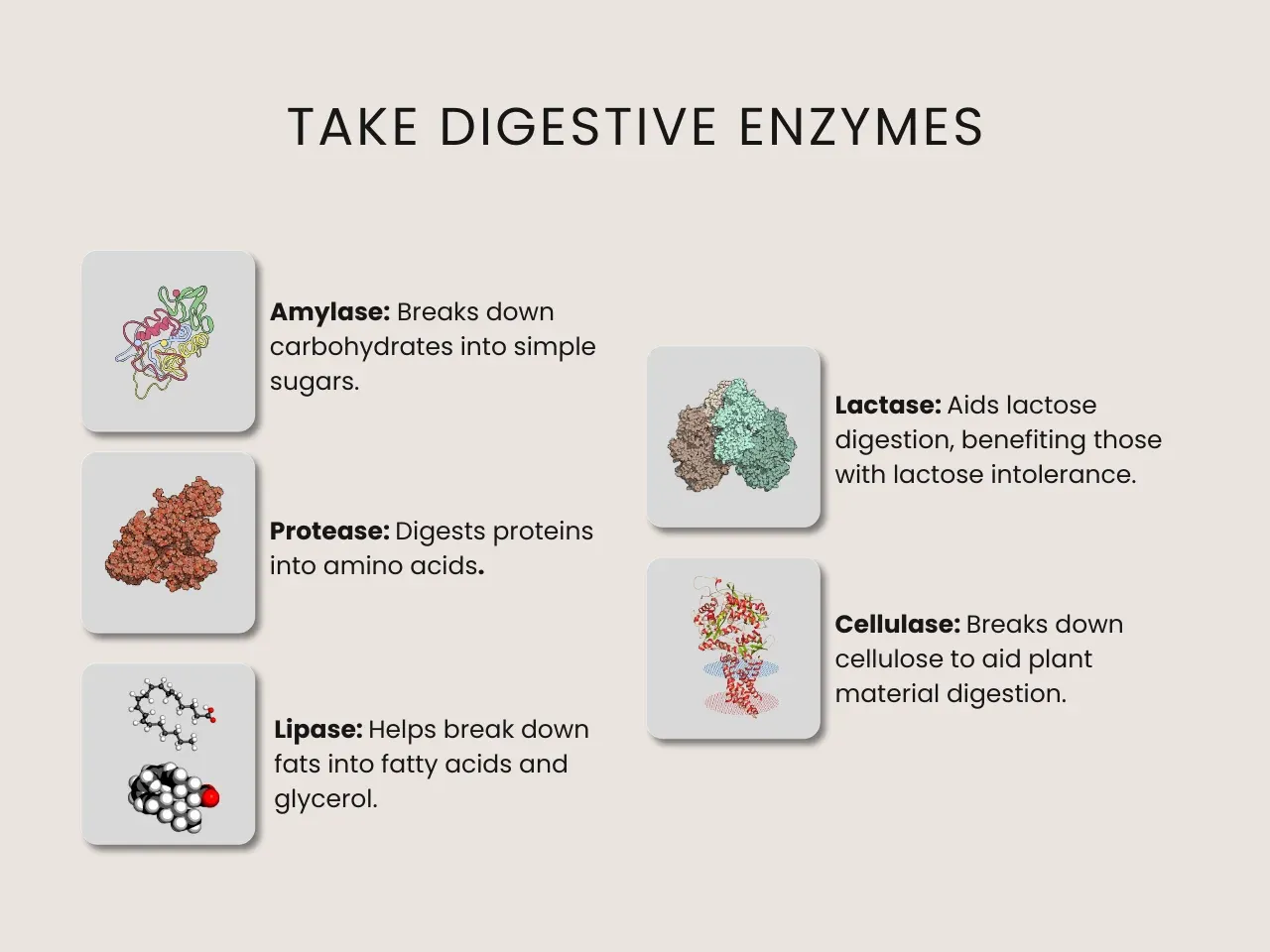
Digestive enzymes are a SIBO natural treatment that plays a crucial role in breaking down food. They help the body absorb nutrients more efficiently, reducing the burden on the digestive system. For individuals with SIBO, this can minimize fermentation caused by bacteria, lessening symptoms like bloating, gas, and discomfort.
Types of digestive enzymes beneficial for SIBO:
- Amylase: Breaks down carbohydrates into simple sugars.
- Protease: Digests proteins into amino acids.
- Lipase: Helps break down fats into fatty acids and glycerol.
- Lactase: Assists in digesting lactose, which can benefit those with lactose intolerance.
- Cellulase: Breaks down cellulose, aiding in the digestion of plant materials.
Taking digestive enzymes with meals can optimize their effectiveness. It is recommended that they be taken right before or at the beginning of a meal. This timing ensures that the enzymes mix with food, aiding in its breakdown. The benefits of using digestive enzymes include reduced symptoms of SIBO, improved nutrient absorption, and enhanced overall digestive health.
Incorporating a supplement like Nudge SIBO supplement into your routine can also support digestive health. This supplement contains a blend of natural ingredients that target SIBO symptoms. Regular use can help maintain a balanced gut environment, reducing bacterial overgrowth. It also supports the body's natural digestive processes, promoting a healthier digestive system.
5. Use Herbal Antimicrobials

Herbal antimicrobials help reduce bacterial overgrowth in the small intestine. They offer an SIBO natural treatment option, targeting harmful bacteria without disrupting gut flora balance. These natural compounds serve as an effective alternative to conventional antibiotics.
Common herbal antibiotics for SIBO:
- Oregano Oil: Known for its antimicrobial properties, it combats various bacteria.
- Berberine: Extracted from plants like goldenseal, berberine helps reduce bacterial growth.
- Allicin: Derived from garlic, allicin exhibits strong antibacterial effects, aiding SIBO treatment.
Using herbal antibiotics safely involves adhering to recommended dosages and durations. Monitoring for potential side effects, such as gastrointestinal upset or allergic reactions, is essential. Consulting a healthcare professional ensures the safe and effective use of these treatments. Herbal antibiotics provide a viable SIBO natural treatment option, promoting gut health while managing symptoms effectively.
6. Take Vitamin D and Zinc Supplements
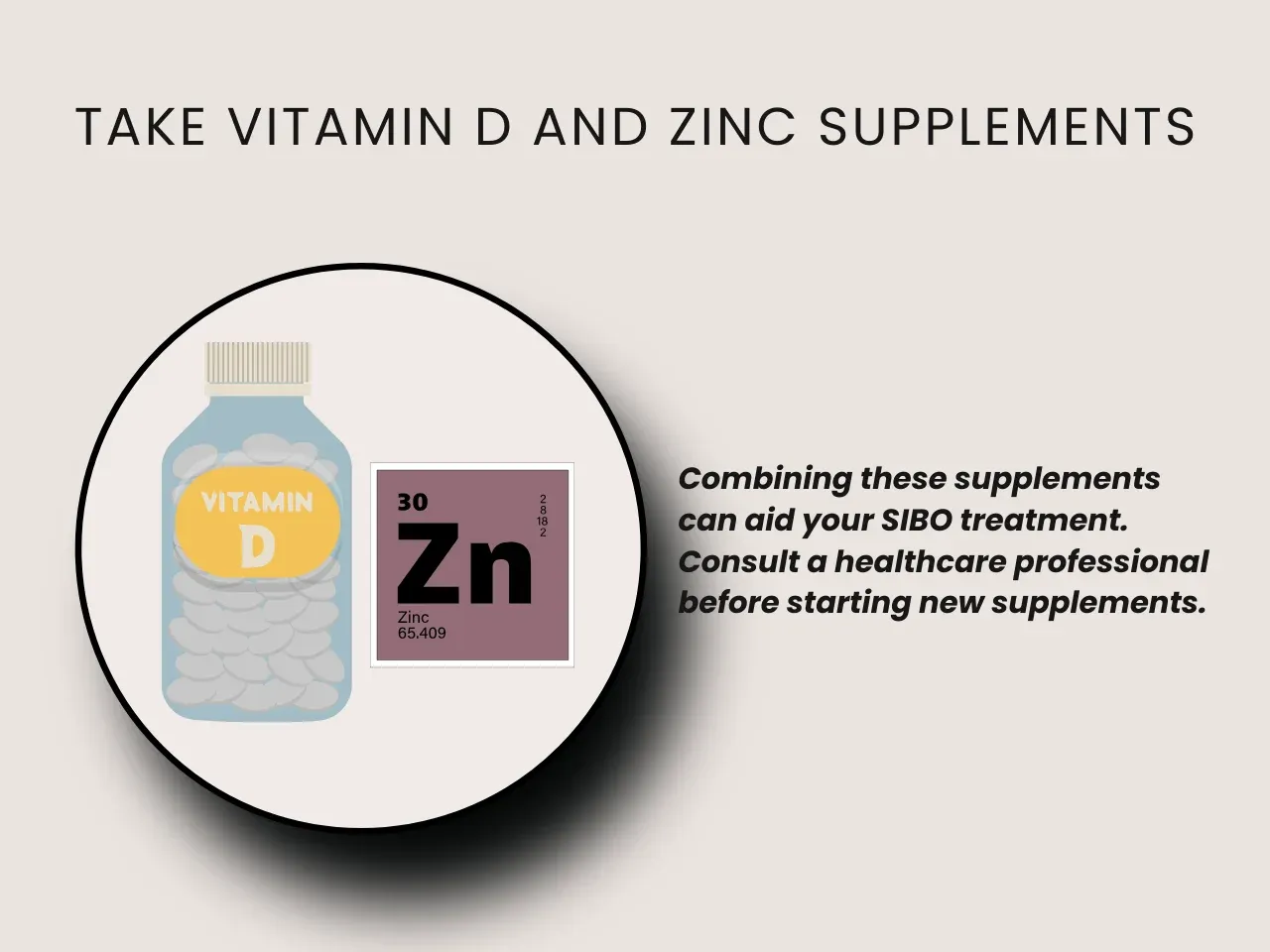
Vitamin D plays a key role in managing your immune system. This vitamin is necessary for helping your body fight off bacteria that can overgrow in the small intestine. Having enough Vitamin D helps your immune system work better to combat infections and stay healthy. Taking a Vitamin D supplement daily can greatly improve your ability to manage SIBO symptoms.
Zinc is a mineral that helps the intestines work properly. It reduces inflammation and supports the intestinal barrier—the lining of the intestine. Sometimes, this lining can be damaged in people with SIBO. Taking a zinc supplement every day can make the intestinal barrier stronger. A stronger intestinal barrier means fewer symptoms and better absorption of nutrients from food.
Combining these two supplements can be integral to your SIBO natural treatment plan. Always consult a healthcare professional before starting new supplements to ensure they are appropriate for your health needs.
7. Manage Stress Level

Stress negatively impacts gut health, often exacerbating SIBO symptoms. The body's stress response can disrupt normal digestion, leading to an imbalance in gut bacteria. Reducing stress levels is crucial for effective SIBO natural treatment.
Effective stress management techniques include:
- Yoga: Practicing yoga enhances relaxation and reduces stress hormones.
- Meditation: Regular meditation calms the mind and promotes emotional stability.
- Deep Breathing Exercises: These exercises help lower stress and improve focus.
- Physical Activity: Regular exercise releases endorphins, which improve mood and reduce stress.
Incorporating stress management into your daily routine helps maintain a balanced life. Start your day with a few minutes of meditation or yoga. You may also dedicate deep breathing exercises during your workday. Plus, engage in physical activity, such as a morning walk or evening workout. Creating a consistent routine ensures that stress management becomes a regular part of your life, aiding in effective SIBO natural treatment.
Additionally, monitoring stress levels and adjusting techniques are essential. Keep a journal to track your stress levels and note which activities help most. If one technique seems less effective, try another. Adjusting your approach ensures that you manage stress effectively, leading to improved gut health and reduced SIBO symptoms. Regularly consulting with healthcare professionals can provide additional guidance tailored to your needs.
8. Regular Exercise
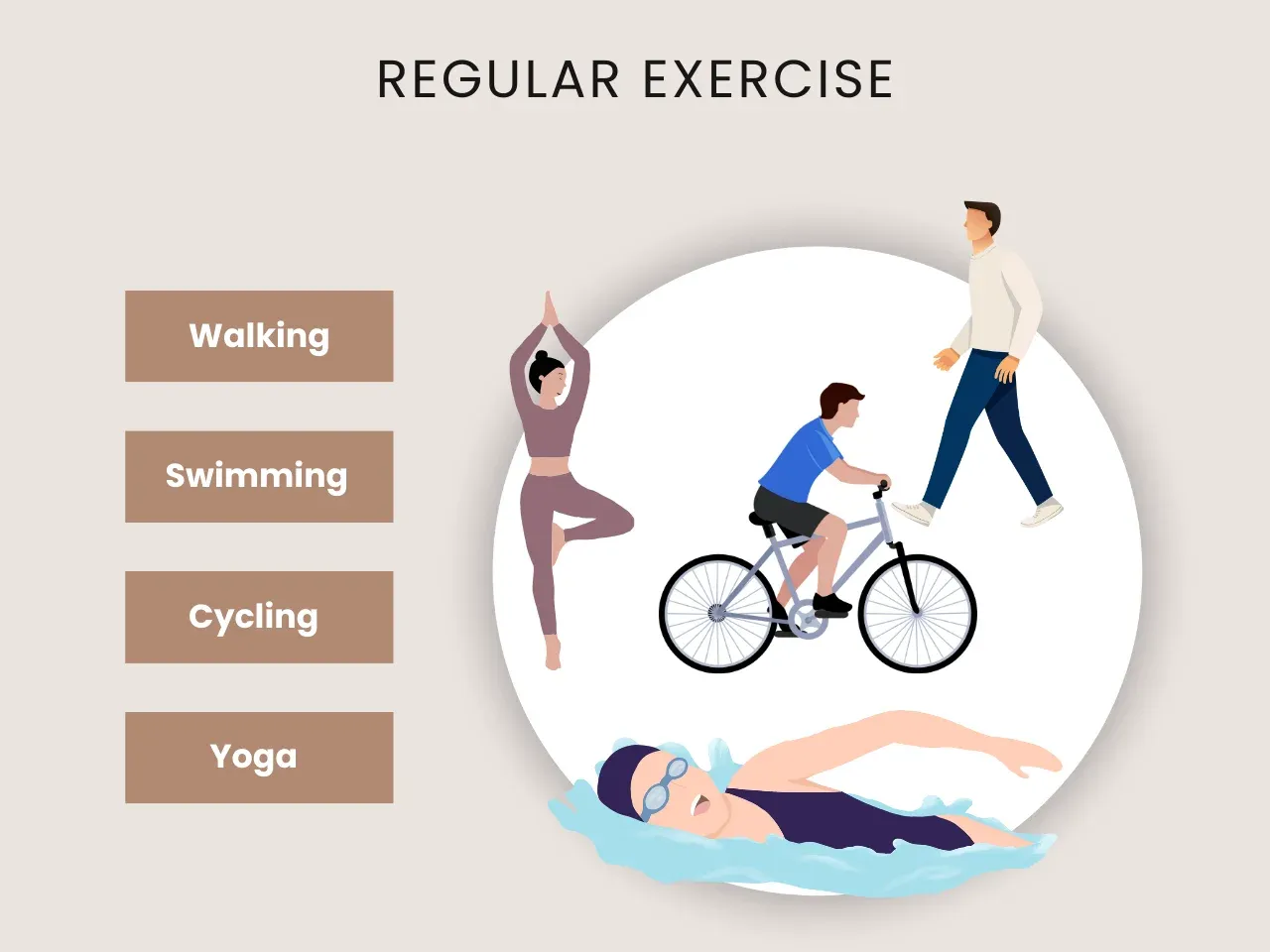
Exercise is essential for maintaining a healthy digestive system. It improves blood circulation to the intestines, which helps with digestion. Exercise also helps regulate bowel movements. For people with SIBO, exercising regularly can help manage symptoms. Staying physically active promotes overall gut health, making regular exercise a natural SIBO treatment option.
Here are the types of exercises beneficial for SIBO:
- Walking: A low-impact exercise that stimulates digestion and reduces bloating.
- Swimming: Provides a full-body workout, promoting gentle movement in the digestive tract.
- Cycling: Boosts cardiovascular health while encouraging regular bowel movements.
- Yoga: Combines physical activity with stress relief, aiding digestion and mental well-being.
Start with simple activities like walking or gentle yoga. Gradually increase intensity and duration. Schedule workouts at the same time each day to establish a habit. Consistency proves key to reaping the benefits of exercise. Listen to your body and adjust activities as needed to avoid overexertion.
Regular physical activity offers multiple benefits for those seeking SIBO natural treatment. Taking regular exercise has numerous benefits when managing SIBO symptoms, helping to decrease bloating and discomfort in the abdominal area. Exercise also supports regular, healthy bowel movements.
Additionally, physical activity can relieve stress and anxiety. Engaging in exercise regularly boosts overall energy levels and enhances mood. Incorporating exercise into your daily routine can significantly improve your quality of life when dealing with SIBO.
Key Takeaway
Managing SIBO symptoms naturally involves focusing on lifestyle changes and herbal remedies. SIBO primarily affects the small intestine but can influence the large intestine's health. SIBO natural treatment often includes dietary adjustments and specific herbal remedies that have shown promise in clinical trials. These strategies help reduce symptoms and improve the quality of life for SIBO patients.
For those experiencing symptoms similar to SIBO, it's crucial to consider an IBS quiz to differentiate between the conditions, as treatment strategies can vary significantly. Understanding whether your symptoms relate to SIBO or another condition within the colon can guide the appropriate lifestyle and dietary changes. Engage with healthcare professionals to ensure that you receive a treatment plan tailored to your needs.
Are you ready to take control of your health with effective SIBO natural treatment options? Exploring SIBO supplements can be a pivotal step. These supplements and recommended lifestyle changes offer a proactive approach to managing SIBO. Let Nudge help you navigate your journey toward better digestive health. Why not start today? Avail our 1-month trial now.